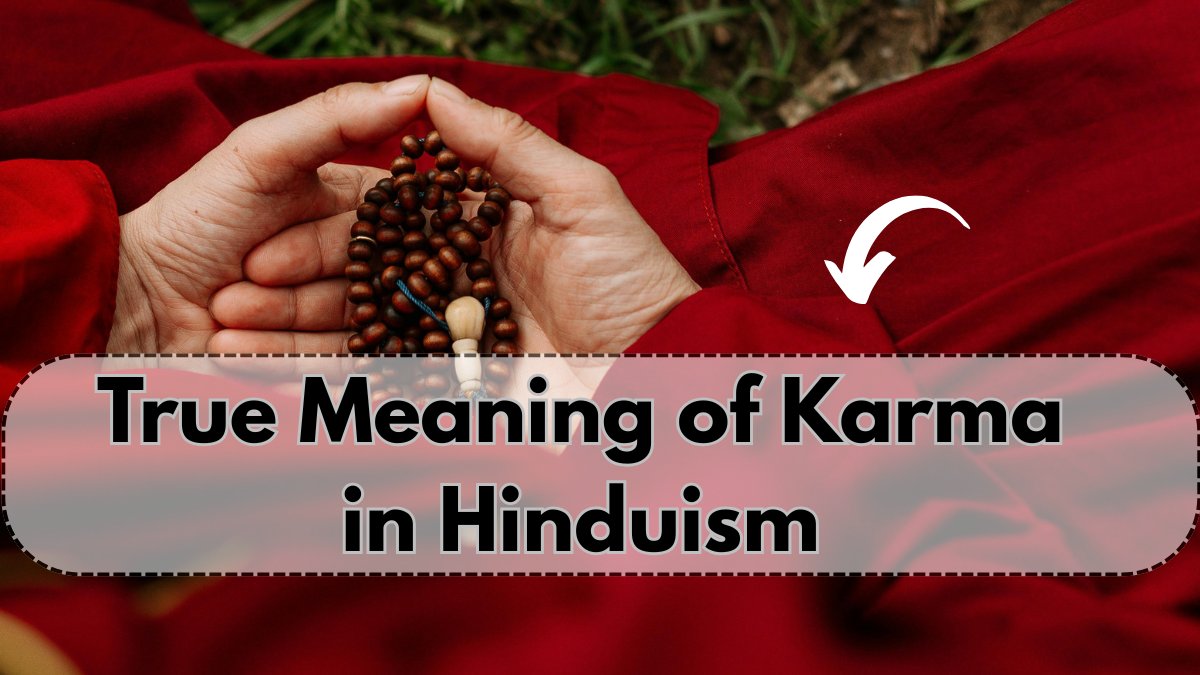Karma is one of the most widely misunderstood concepts in the world today. Many people believe karma is about revenge or instant punishment. But in reality, the true meaning of karma in Hinduism is far more profound and empowering. Rooted in the ancient scriptures like the Bhagavad Gita, karma is about our actions and results, and the moral law that governs life across lifetimes.
In Hindu dharma, karma serves as a guiding force to help individuals live ethically, responsibly, and consciously. It is a concept that reminds us: every thought, word, and deed has consequences. Let’s explore the deeper truth behind karma explained from a traditional Hindu perspective.

Understanding the Real Definition of Karma
The Sanskrit word “karma” literally means “action.” In Hinduism, it refers not just to physical action but also to our thoughts, intentions, and choices. Every action leaves a subtle imprint or energy, which returns to us in some form—now or later.
There are three main types of karma:
-
Sanchita Karma – accumulated past karmas
-
Prarabdha Karma – portion of past karma being experienced now
-
Kriyamana Karma – current actions that create future karma
This structure of karma explained shows that we are neither victims nor prisoners—we are participants in shaping our destiny.
Karma Is Not Punishment—It’s a System of Balance
Contrary to pop culture, karma in Hinduism is not about instant retribution. It is a self-regulating system of balance. If you plant kindness, you eventually harvest peace. If you sow dishonesty, the outcome is confusion or pain—not as punishment, but as a lesson.
Karma is about:
-
Cause and effect
-
Responsibility and learning
-
Alignment with Hindu dharma
This understanding leads to more conscious choices in life.
Karma and Rebirth – The Cycle of Samsara
In Hindu belief, the soul (Atman) is immortal and goes through cycles of birth, death, and rebirth known as samsara. Our karma determines the circumstances of each life.
| Karma Type | Effect on Life |
|---|---|
| Good (Positive) | Joy, opportunities, peace |
| Bad (Negative) | Challenges, suffering, delays |
So, when asking “Why is this happening to me?”—karma explained offers insight. What we experience now could be the result of past actions, and what we do now shapes our future.
Karma Yoga – The Path of Action Without Attachment
One of the most empowering forms of spiritual practice in the Bhagavad Gita is karma yoga—the discipline of selfless action. It teaches that while we must act, we should not be attached to the results.
Key practices of karma yoga:
-
Do your best, release expectation
-
Serve others without ego
-
Accept outcomes with grace
This form of karma in Hinduism encourages mindfulness, humility, and inner peace.
Karma in Daily Life – Applying It Meaningfully
Understanding karma explained doesn’t end in philosophy. It’s deeply practical. When we realize that our actions shape not only our present but our future, we naturally become more thoughtful.
Here’s how you can live a karma-conscious life:
-
Speak truthfully and kindly
-
Help others without expecting rewards
-
Reflect before reacting
-
Practice gratitude daily
These small changes align our life with Hindu dharma and bring lasting peace.
FAQs
What does karma mean in Hinduism?
Karma in Hinduism means action. It includes all thoughts, deeds, and intentions that create results based on moral cause and effect.
Is karma punishment or fate?
No. Karma is not punishment. It is a spiritual law of balance. It teaches us responsibility and growth through our actions and results.
How does karma relate to rebirth?
In Hindu dharma, karma determines our rebirth. Good karma leads to better circumstances in future lives, while negative karma presents lessons to be learned.
What is karma yoga according to the Gita?
Karma yoga is the practice of selfless action without attachment to the results. It is one of the key Gita teachings.
Can we change our karma?
Yes, by making conscious choices and performing good deeds, we can create positive karma and reduce the effects of past actions.
Click here to know more.
